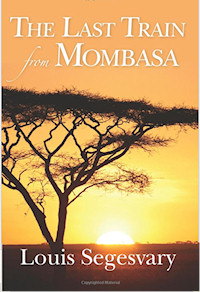 Louis (Lajos) Segesváry's "The Last Train from Mombasa" is a graphic, richly symbolic excursion into modern Africa in which western sensibilities encounter the continent in all its travail and promise. Exemplifying Africa’s lush beauty and potential, an exotic native translator named Wangetha Wachira captivates Alain Sardou, who is a French journalist on assignment to Kenya. Louis (Lajos) Segesváry's "The Last Train from Mombasa" is a graphic, richly symbolic excursion into modern Africa in which western sensibilities encounter the continent in all its travail and promise. Exemplifying Africa’s lush beauty and potential, an exotic native translator named Wangetha Wachira captivates Alain Sardou, who is a French journalist on assignment to Kenya.
Before long they are pitted against the machinations of her jealous former lover, Robidi Amimuga, the corrupt, diabolical High Commissioner of Zimugabwa, once heralded for his revolutionary past. Unfolding against the backdrop of Africa’s magnificent landscape and wildlife, their plight draws a disgruntled former American Marine and Wangetha’s own prodigal brother into an uneasy alliance with Sardou against Amimuga and his cohorts.
Poignant glimpses of the struggles of ordinary Africans and the spiritual and emotional currents of their lives are woven into the narrative to complete its rich tapestry of sounds and colors.
What readers are saying:
"An honest, action-packed, and aesthetic literary depiction of modern Africa" - "The Last Train from Mombasa," a novel based in East Africa, was compelling for me on several levels:
1. Story line - riveting, action-packed, and thought provoking. I was led to speculate, page after page, how the two main characters, from totally different backgrounds and experiences, might have intersecting fates and at what cost.
2. Lyrical - in its aesthetic descriptions of the land and its people. I could see the "shimmering ball of fire" that is the "equatorial sun" and the "long-necked giraffes nibbling on the thistle bushes." I could hear the screams in Swahili of "Hapana, Hapana" by the terrified boy in the midst of an angry mob on the streets of Nairobi. I could taste the rich Kenyan coffee and the sandwich with ugali paste.
3. Historical - in its portrayal of tribal conflicts, foreign interests and intervention as they relate to modern Africa. I could begin to understand the basis for the conflicts among the Kikuyu, Kalenjin, and Masai and the challenges and opportunities facing Africa today as the African and Western psyches and wills meet.
4. Psychological - in its rich symbolism of characters and what they represent as they pertain to the travail and promise of Africa. I was repulsed by Robidi, symbolizing the corruption that threatens to undermine Africa's efforts for progress. But I was inspired by Wangetha, the symbol of the enduring power, beauty, and spirit of Africa, in spite of terror and brutality.
Buy his book now on the AHF Amazon Store 
[<< Back to all Publications]
[<< Back to All AHF News]
|
Buy his books now on the AHF Amazon Store 
Help AHF by purchasing all your products using the AHF Amazon Store! You pay nothing
more and AHF earns a small percentage:
About the Author
 The author, Louis Segesvary, is of Hungarian birth and a naturalized U.S. citizen. An AHF Patron Member serving on the AHF International Affairs Committee, Dr. Segesvary served as a career American Foreign Service officer for 22 years, with assignments in Latin America, Europe, Africa, and the United Nations during the 1980s and 1990s. He holds a Ph.D. in Romance languages and literature and writes from Northern Virginia, where he resides with his wife, Beata, a teacher and performer of the violin. His books are available on the AHF Amazon Store! The author, Louis Segesvary, is of Hungarian birth and a naturalized U.S. citizen. An AHF Patron Member serving on the AHF International Affairs Committee, Dr. Segesvary served as a career American Foreign Service officer for 22 years, with assignments in Latin America, Europe, Africa, and the United Nations during the 1980s and 1990s. He holds a Ph.D. in Romance languages and literature and writes from Northern Virginia, where he resides with his wife, Beata, a teacher and performer of the violin. His books are available on the AHF Amazon Store! 
Downloadable Articles by Dr. Louis Segesvary
- C.G. Jung: A Matter of Heart - by Louis S. Segesvary, American Consul General (English version as published in the Neue Zürcher Zeitung, February 19, 1987) ...while five other less ambitious films have been made on Freud, with limited public impact, nothing has been produced for commercial distribution on the life and work of C.G. Jung, who became the most famous, controversial, and influential of the original group around Freud after breaking with him to develop his own school of analytical psychology. Now such an attempt has been made in the United States [download]
- Európa szkizofréniája, vagy az 'európai' ember tragédiája - By Louis Segesváry,
Former US diplomat and a senior member of the United States Department of State. "A Straszburgi Európai Tanácsban 2006. január végén lezajlott vita és a pár nappal később megszavazott határozat a totalitáriánus kommunista rendszerek bűneinek elítéléséről és az áldozatokra való megemlékezésről a legvilágosabb jele a mai európai ember tudathasadásos állapotának, s egyúttal európai kultúránk jelenkori tragédiájának végső felvonását jelenti." [download]
- Soviet Insecurity: A Lonely Woman Poses a Threat (Historical snapshots of the cold war. Lest we forget how it was: Published column on the Conference on Security and Cooperation in Europe that took place in Bern, Switzerland in April, May 1986) - By Louis S. Segesvary, Visiting Foreign Affairs Fellow, Georgetown Center for Strategic and International Studies. [download]
- THE WORLD VIEW OF KOSSUTH LAJOS
- By Louis S. Segesvary, Ph.D.
Commemoration of the Hungarian Revolution of 1848 American Hungarian Federation
American University, Washington, D.C.
March 14, 2004 [download]
Join online!

|



